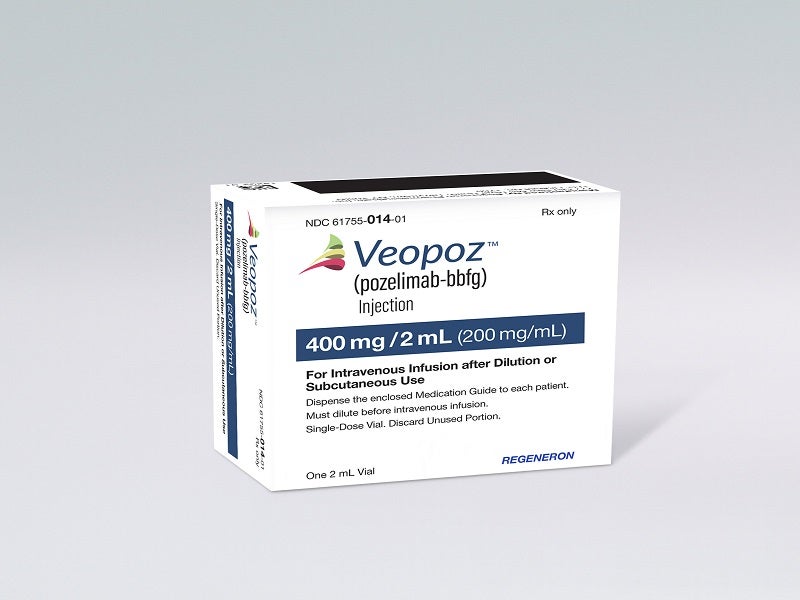Veopoz (pozelimab) is a complement inhibitor indicated for the treatment of adult and paediatric patients aged one and older with Chaple disease, also called CD55-deficient protein-losing enteropathy (PLE).
Developed by the US-based biotechnology company Regeneron, using the proprietary VelocImmune technology, Veopoz is designed to target complement factor C5, a protein involved in complement system activation.
Veopoz is a clear to slightly opalescent, colourless to pale yellow solution in single-dose vial in 400mg/2ml dosage strength for intravenous and subcutaneous injection.
Regulatory approvals for Veopoz
Veopoz received US Food and Drug Administration (FDA) approval for the treatment of Chaple disease in August 2023. The approval was based on the data from pivotal Phase II/III trials and represents the tenth FDA-approved medicine developed by Regeneron.
Veopoz underwent a priority review, leading to the company being awarded a Rare Paediatric Disease Priority Review voucher upon its approval. Veopoz had been earlier designated as a Rare Paediatric Disease, Orphan Disease, and Fast Track product.
Chaple disease causes and symptoms
Chaple disease is a rare and life-threatening inherited immune disease characterised by an abnormal activation of the complement system.
Responsible for eliminating microbes in healthy individuals, the system becomes dysregulated in people with Chaple disease due to mutations in the CD55 gene, a crucial complement regulator.
Individuals with Chaple disease experience difficulties in regulating complement activity, leading to an overactive response that can target the body’s own cells.
The uncontrolled complement activation can result in damage to blood and lymph vessels in the upper digestive tract, causing the loss of circulating proteins.
The prevalence of Chaple disease is extremely low, with fewer than ten identified cases in the US and fewer than 100 worldwide.
Symptoms can include abdominal pain, nausea, vomiting, diarrhoea, loss of appetite, weight loss, impaired growth, and oedema (swelling).
Severe thrombotic vascular occlusions (blockage of blood vessels) can also occur among patients with Chaple disease, which can be life-threatening.
Veopoz’s mechanism of action
Pozelimab is a human, monoclonal immunoglobulin G4P antibody that binds with high affinity to wild-type and variant human C5. It inhibits terminal complement activation by blocking the cleavage of C5 into C5a and C5b, thereby blocking the formation of the membrane attack complex (C5b-C9, a structure mediating cell lysis).
Clinical trials on Veopoz
The FDA approval of Veopoz is based on the results from Phase II/III open-label clinical trials that evaluated the efficacy and safety of Veopoz on active CD55-deficient PLE patients.
The study enrolled ten patients with CD55-deficient PLE, ranging from three to 19 years of age.
The patients received a single loading dose of pozelimab 30mg/kg intravenously on day one, followed by subcutaneous weekly weight-based doses of pozelimab.
All the ten patients achieved normalisation of serum albumin and serum IgG concentrations by week 12 and maintained these concentrations through at least 72 weeks of treatment.
The patients also demonstrated a reduction in the number of hospitalisations and albumin transfusions over the first 48 weeks of treatment compared to the 48 weeks prior to treatment.
The most common adverse reactions reported during the clinical trials were upper respiratory tract infection, fracture, urticaria, and alopecia.
Veopoz is also being assessed in conjunction with Alnylam’s cemdisiran, a siRNAi C5 inhibitor, as an investigational combination therapy for addressing various complement-mediated disorders such as paroxysmal nocturnal haemoglobinuria and myasthenia gravis.





